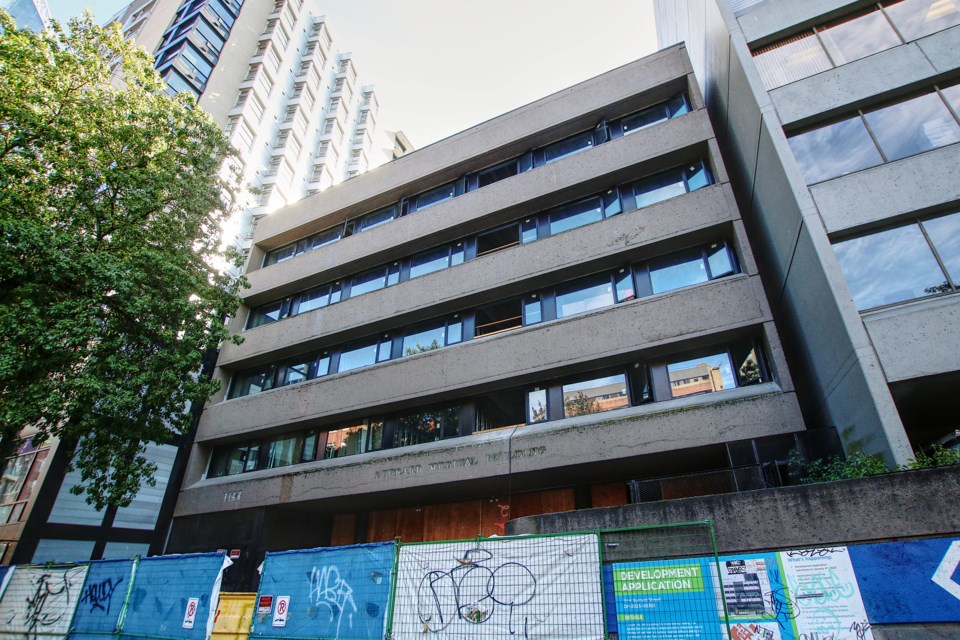Demand for hotel rooms in Metro Vancouver pushed the average room rate in July to the highest price point ever seen in a major Canadian city, in previous month: $358.35 per night.
Despite that—or perhaps driving those sky-high prices—Metro Vancouver had the highest occupancy levels for any metropolitan region in Canada.
Data for the region has been trending toward higher rates and occupancy for years, and it has set off a development boom as developers navigate zoning, permits and financing that can be trickier to get than for residential or office projects.
Data collectors at Lodging Econometrics in August counted a record-high 59 hotel projects underway across the province that are expected to provide 8,439 new rooms when complete.
Of those, 21 are in Metro Vancouver, down from a record-high 23 hotel projects in the region last quarter, Lodging Econometrics senior vice-president JP Ford told BIV.
He said those 21 projects include six under construction, two slated to start construction in the next year and 13 in the early planning phases.
Time will tell how that new supply impacts hotel room rates and occupancy levels.
CoStar, a global provider of real estate data, analytics and news, calculated that Metro Vancouver room rates in July broke a national record. The area beat the .
Room rates in Metro Vancouver moderated to $347.08 in August of this year, but that was still up 4.5 per cent, compared with August 2023.
Hotel occupancy in Metro Vancouver is usually the highest among major cities in Canada, although every so often the region slips to second place, after Metro Toronto.
Metro Vancouver had the second-highest hotel occupancy , but regained its title as the occupancy leader in July, with 85.7 per cent of the rooms filled on average. In August the region again had the highest occupancy among major Canadian centres, with the rate increasing to 87.6 per cent.
Rising occupancy and room rates is fuelled in part by tighter provincial rules governing the short-term rental market.
The law, which took effect May 1, such as those listed on VRBO and Airbnb to within hosts’ primary homes, basement suites or laneway houses on properties that are the hosts’ primary residences in 60 new communities. Another 17 communities newly chose to adopt those regulations even though they were exempt from the provincial legislation.
The City of Vancouver has long had this limitation on short-term rental hosts. Many other cities in the region, such as Burnaby, New Westminster, Delta, North Vancouver, West Vancouver and Surrey, however, did not, and those cities are newly adjusting to allowing fewer short-term rental listings.
Hotel projects aim to alleviate the hotel shortage
Plenty of hotels large and small are in various stages of development.
The largest proposed hotel project in Metro Vancouver is .
The company earlier this year submitted its rezoning application and received approval. It now seeks a development permit.
Completion is a long way off.
Henriquez Partners Architects principal Gregory Henriquez, an architect on the project, told BIV hotels tend to take eight years from conception to completion: four years to go through city bureaucracy and approvals, and four years to build.
“The big issue is that the volume of [construction] project applications has gone up with the Broadway plan,” he said. “City staff are inundated.”
Henriquez said he is involved in two other hotel projects that he could name, and two that are not yet public.
One project that Henriquez is working on is at 888 West Broadway, where Bosa Properties Inc. plans to build two hotels and have a combined 400 rooms.
The other project Henriquez said he could discuss is Bosa Properties’ into a mixed-use development with a 174-room hotel and 126 residential units.
Amacon’s vice-president of executive operations, Stepan Vdovine told BIV that his company’s hotel projects include one at 1144 Burrard Street, where it is converting what was an office building into a hotel with approximately 70 rooms.
“It’s been an interesting project because it’s a conversion,” he said. “There’s a lot of conversions of office to residential. Converting office to hotel use is a fairly hot topic these days. It has been for several years, with office-vacancy rates being so high.”
He estimated that the Burrard Street project’s conversion would be complete sometime next year.
Vdovine added that Amacon is building a 120-room hotel at 150 Robson Street. It is also in the early stages of proposing to build a hotel at the Amazing Brentwood in Burnaby. Specifics of that project are yet to come, he said.
“There is not a single hotel in Brentwood today,” he said.
Some other Vancouver hotel projects underway include:
• A 30-storey, 393-room tower at 848 Seymour Street that involves Paul Y. Construction, Forme Development and Perkins & Will Architects;
• A Deecorp Properties project at 717 Davie Street—a street address that does not currently exist but which is where the Cold Tea Restaurant is situated, at Granville Street; and
• A QWID Capital Partners project to build a hotel in Chinatown, next to the Keefer Bar.
Developers such as Vdovine and Cressey Development Group executive vice-president Hani Lammam told BIV that getting financing for hotel projects can be more challenging than getting financing for office or residential projects.
“With hotels, you don’t have a proven income stream,” Lammam said. “In a rental building, it is pretty easy to calculate, from rents and operating expenses, what is the operating income.”
Because hotels are a separate business, and in a sector that can be cyclical and seasonal, it is less clear whether the venture will have operating income, he said.
That means that it is a higher risk for lenders.
“The developer’s financial strength is really what determines whether you can get financing, not the feasibility of the proposed project,” Lammam said.




